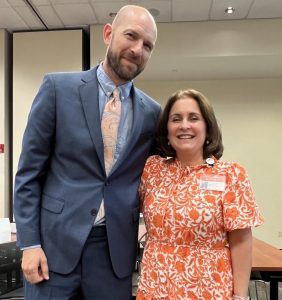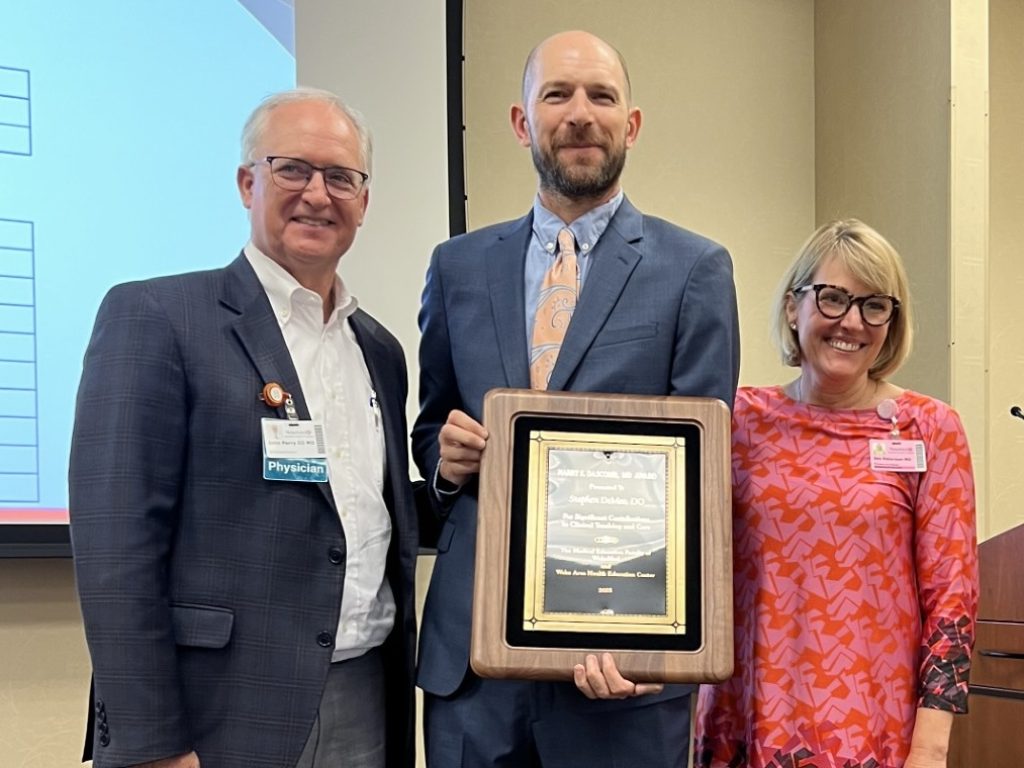Dr. Stephen DeMeo is the recipient of the 2025 Harry E. Dascomb, MD, Award for Excellence in Clinical Teaching and Care.
DeMeo serves as pediatric clerkship site director for the Campbell medical school at WakeMed and regional assistant dean for the med school’s clinical campus in Raleigh, among numerous other roles, including associate professor of Pediatrics at Campbell.
Dr. Lori Langdon helped present the honor to DeMeo during an event in Raleigh on July 17. Langdon is clinical chair of Pediatrics at Campbell’s Jerry M. Wallace School of Osteopathic Medicine, an assistant professor and director of the university Health Center.
The honor presented to DeMeo is named for Dr. Harry Dascomb, an infectious disease specialist at WakeMed famous for his bedside teaching and compassionate patient care, according to award materials.
The Dascomb Award, WakeMed’s highest teaching honor, is presented annually to a physician who demonstrates excellence in clinical teaching and patient care. Recipients must demonstrate support of clinical teaching programs at WakeMed over at least three years.
“I am incredibly honored, and humbled, to have received the Dascomb award, as the list of past recipients include some talented physician educators that I feel like I still aspire to be like,” DeMeo says.
DeMeo says he isn’t the first neonatologist to win the award; Dr. Jim Thullen, a DO, earned it in 1999.
“That is particularly moving to me, as Dr. Thullen was one of the physicians that developed the first intensive care nursery at WakeMed Raleigh in the late 1970s, and of course, that he was a DO long before our profession had the recognition in North Carolina that it has today.”
Winner of multiple preceptor of the year honors for the Raleigh region, DeMeo is a board-certified neonatologist who joined WakeMed Physician Practices-Neonatology in 2015, according to his nomination materials.
“Education, like medicine, is a team sport,” he says. “And while I was the recipient of this award, I am able to do what I do because of an amazing team of neonatologists, pediatricians, nurse practitioners, PA’s and nurses who are just as dedicated to creating a wonderful teaching environment in our nurseries.”
DeMeo says he became interested in neonatology as early as medical school, when he got the opportunity to rotate in the neonatal intensive care unit as a student.
“I love that NICU is an environment where we get to practice critical care medicine on some of the most fragile patients in the hospital, while benefiting from a relative continuity of care with families that you don’t experience in other ICU settings,” he says.
“Some of our families stay in our unit for two to three months, and we continue to follow them in our neurodevelopmental follow-up clinics. The biggest challenge is treating issues that are very much affected by forces outside our walls — that is, prematurity, undiagnosed pre-eclampsia, or limited prenatal care, that is caused by socio-economic or other issues.”
Dascomb, who died in 2008 at 91 years old, in 1948 began teaching about Infectious Diseases, Hospital Infections and Tropical Diseases at Louisiana State University, where he worked for 35 years. The student body at LSU regularly selected Dascomb “Most Inspirational Professor.” He joined WakeMed in the early 1980s and in 1988 helped to establish the award bearing his name.
As part of her presentation, Langdon detailed DeMeo’s achievements and accomplishments and talked about the role pediatricians play in today’s healthcare environment.
A nominating letter says Dr. DeMeo has “consistently demonstrated an extraordinary commitment to medical education and the highest standards of clinical teaching.”
Said one student, “He was always willing to teach, allowed me to have independence and prepared me well for a residency in pediatrics. Dr. DeMeo is not only an excellent preceptor, but he also took the time to help me prepare for residency during my time with him.”
DeMeo, of New Hampshire, earned his undergraduate degree from Muhlenberg College and medical degree at the Philadelphia College of Osteopathic Medicine. He received a master’s degree in medical education from the University of New England and completed his pediatrics internship and residency at Jefferson/Alfred I. DuPont Hospital for Children, where he also served as chief resident.

An adjunct assistant professor of Pediatrics at UNC School of Medicine, DeMeo completed his fellowship in neonatal-perinatal medicine at Duke University, where he helped found the Duke Medical Education Scholars group.
His relationship with Campbell’s med school, DeMeo says, has been a part of his story at WakeMed from the beginning.
“I always say to medical students, ‘If an attending insinuates that they got the position they are in by virtue of some master plan that they’ve executed to perfection, they are probably not telling you the whole story!”
DeMeo considers it “a bit of luck” that, in the summer of 2015, as he was finishing fellowship, that a neonatologist was retiring from WakeMed, and a new osteopathic medical school was about to send its inaugural class to their clinical rotations that summer.
“From then on it’s been an amazingly gratifying relationship; mentoring medical students, seeing them match into their dream residency programs, and in some cases, coming back to WakeMed to join us as colleagues,” DeMeo says. “The partnership between WakeMed and CUSOM is clearly fulfilling our mission to train physicians who are going to serve in the communities where they, and us, have roots.”
DeMeo’s and Langdon’s passion for and commitment to pediatrics is especially relevant today.
Langdon is the author of “Doctors Work in Air Conditioning: An Intimate look at Southern Culture and the Challenges of Rural Medicine.” In the book, Langdon pulls from almost 30 years’ experience as a rural pediatrician, telling stories of her childhood through finding a place in academia.
“We have a pediatrician shortage,” Langdon said as part of her presentation July 17.
Twenty N.C. counties are without a pediatrician, she said, and in the 2024 nationwide pediatric match, 250 slots went unfilled — about 150 this year. The Journal of The American Medical Association says applicants to pediatrics residencies are decreasing, and many pediatricians are leaving the field early or working part-time to make the career sustainable.
Healthcare disparities in rural areas for children, too, are worsening, says Langdon, who remains encouraged by the support of groups, including the American Academy of Pediatrics and similar organizations, that embrace and spread positive messages about pediatrics, for example, or the challenges of rural medicine and the importance of vaccines, especially for parents who may be hesitant or simply misinformed.
Advocating for children can mean many things, which include filing relevant reports with Child Protective Services, lobbying lawmakers and speaking to local school boards.
“Tell stories, real stories that were a part of your life. I’m satisfied that I included enough specific stories that actually occurred that the reader will be able to get the full picture of my life and my concerns about rural pediatrics,” she says of her book.

